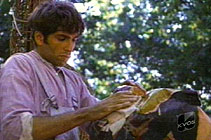|
|
|
|
Good
Morning Babylon
|
 |
|
Italy's Taviani brothers (Paolo and Vittorio) are a pair of post-Marxist crazies who have moved further and further from realism and into a terrain of mythic storytelling. In their best work (such as the extraordinary Kaos [1984]), Romanticism still manages to meet cultural politics deep down within the well of collective emotion. The Tavianis can be characterised by their interest in three particular things: a fascination with the physical labour of creation, and the grand works it produces; a belief in mystical communications between souls, not so much in a religious regime but as a kind of ecstatic materialism; and, most profoundly, an obsession with all sorts of primal separations, those moments when great human twosomes (parent-child, man-woman, teacher-student) get torn irrevocably asunder. Good Morning Babylon (the film leaves out the comma, not me) forsakes the pain of separation for some rather excruciating myth-making about two brothers (played by Vincent Spano and Joaquim De Almeida) who are as one. Starting with them, everything comes in twin-packs: two identical girls, two identical father figures (their own father, and D. W. Griffith [Charles Dance]), two identical life paths. There are moments of Taviani magic – in particular, a scene in which the imagining of Rossini's "The Thieving Magpie" starts to open up those mystical correspondences between different worlds, surrealist-style. Alas, much of the rest of the film is clumsy and hard to take, and the adoption of a deliberately naïve tone (to match the innocence of primitive cinema, etc) does not cement the whole. Partly this must be because the Tavianis are making their first film in English. But, in a sense, there is another language they fall foul of even more seriously: the American system of filmmaking. Based on a true story found amidst the legend of the making of Griffith's Intolerance in 1916, Good Morning Babylon comes on for a long while as a straight, naturalistic biopic, rendered in an almost telemovie style. Unfortunately, it gets simple American techniques of believability or verisimilitude wrong every time; the film is neither realistic enough nor stylised enough. Add to this unfortunate tackiness a conception of the "magic of cinema" which rivals in its banality the complementary notion of the "evil of television" displayed in Fellini's poor Ginger and Fred (1986), and you get a modern Myth which never ignites. A pity. © Adrian Martin November 1987 |
![]()